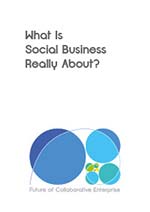Terminology, as language itself, always had a huge impact on our thinking. Considering the pervasive place social media has taken into our online lives, from mundane Facebook conversations to companies-wide collaborative platforms, including strategies as diverse as Youtube-based marketing campaigns, Social CRM initiatives or open innovation frameworks, it appeared to me interesting to look a bit closely at the words themselves: ‘social media’.
Conversely to Web 2.0, or Enterprise 2.0 (or anything 2.0, as far as it seems), the term ‘social media’ doesn’t have a clear origin to trace back. Despite that, it appears that everyone knows about it and has a more or less clear (even if not expressible) idea of what it is. Isn’t ‘social’ about conversation, and ‘media’ about the channels (technologies) that support it? Yes, of course, but meanings are obstinate, so let us listen to what the words themselves have to say.
Social by nature
When writing “Du contrat social” in 1762, Jean-Jacques Rousseau was, after John Locke, theorizing and popularizing the meaning of ‘social’ being the fact of pertaining to a human society as an organized (and beneficial) structure. In this sense, all of our interactions are social. Work, by nature, is social, since implying active interactions inside an organized system.
Symptomatically enough, ‘social’, as in ‘social media’ and most related concepts and tools, seems to relate more legitimately to the ‘outside’ world, where individuals discuss and interact ad libitum, than to enterprise’s world, where its use is even perceived as controversial. It looks like, in executive’s language, the word’s side connotations (of friendliness or of welfare handling) had taken over the deep political and economical implications of the word and of its use. Social CRM, for example, relates to interactions with customers, not to an internal collaborative evolution of CRMs.
Does that really make sense? ‘Social’ is at the heart of our organizations. It isn’t about Facebook. It is about how people interact with each other, how they exchange knowledge, and about the patterns emerging from these knowledge flows. It is the way we manage capabilities, hierarchies, practices, and collaboration. It is the way we drive business and profit. The necessity to deal with the shift needed to cope with a hyper-connected economy, with customers and workers new needs and expectations, cannot be avoided forever, and ‘social’ kept out of the work realm for long.
From media to mediation
Similarly as we underestimate the ‘social’ dimension of ‘social media’, we routinely overestimate its ‘media’ dimension. ‘Media’, as a singular noun, first appeared in 1923, the very same year the first commercial appeared on radio. Since then, its definition shifted from “a means of conveying something” (the original definition of medium) to “a channel broadcasting information”. Media is not about conversation (a two-way exchange of information), but about one-way diffusion of information. Or even, as McLuhan explained in “Understanding media”, about one-way influence this channel holds on our cognition.
Bill Ives, in his last post, pointed me to Douglas Coupland’s book about McLuhan, and to David Carr’s review. Carr quotes McLuhan: “The global village is a place of very arduous interfaces and very abrasive situations … When people get close together, they get more and more savage.” But is this vision, while striking if we look at individuals as a myriad of broadcasters, still relevant if we stop thinking in terms of pushing information through multi-fragmented channels and instead immerse ourselves in a global conversation?
It is no wonder brands began to think of ‘social media’ as new conveyors for push marketing information the same way they broadcast advertising in most other channels –and many still do-; the ‘media’ word is a testimony to that immature interpretation. But this is a reductionist view of what is really happening online: ‘social media’ have become true multiway channels to mediate exchange of knowledge.
It might be time to consider ‘social media’ (or should we say ‘social channels’) from a true ‘social’ point of view: a disruptive environment where knowledge flows freely, and sets the base for a new economical and political ‘social contract’.
I would love to hear your view about that and, oh yes I am late, I wish you a very very very happy New Year.





